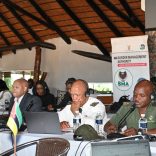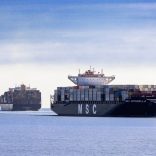Mozambique: Chinese citizen kidnapped in Matola - Watch
Hidden debts trial: 18 November 2021 – AIM report

Photo: Domingo
The fraudulent company Ematum (Mozambique Tuna Company) violated all of the basic rules for registering and licensing ships, an experienced naval engineering inspector, Abilio Tomé, told the Maputo city court on Friday.
Tome, who was trained in Scandinavia, was giving evidence in the case of Mozambique’s hidden debts, in which 19 people are facing charges connected with Ematum and two other fake companies, Proindicus and MAM (Mozambique Asset Management).
Tome is now a senior inspector with the regulatory authority, the National Maritime Institute (INAMAR). He said that all commercial vessels, including fishing boats, which hope to be registered in Mozambique and work in Mozambican waters must be inspected for safety and seaworthiness by INAMAR.
If these vessels are built outside the country, INAMAR should be informed and, if no INAMAR inspector can permanently watch the construction, an INAMAR inspector should be called to witness the three key stages in shipbuilding – although this function can be delegated to a relevant institution in the country where the boats are being built.
Tome said Ematum did not contact INAMAR at all, and so there were no inspections of the fishing boats at the shipyard in the French port of Cherbourg where they were being built. The first Tome knew about a new tuna fishing fleet was when the Ematum boats were being off-loaded from larger ships in Maputo port in 2014.
Only then did Ematum ask for its boats to be registered and licensed, and only then did Ematum provide INAMAR with all the diagrams, specifications and documents on the vessels, which should have been in INAMAR’s possession months earlier.
“The boats were built without INAMAR’s knowledge”, said Tome, “so INAMAR refused to certify them before they were inspected”. He stressed that INAMAR’s procedures are not peculiar to Mozambique – Mozambique is a member of the International Maritime Organisation (IMO) and follows its norms and protocols.
The INAMAR inspection found 40 defects in the Ematum boats. There were problems with, among many other aspects, the communication antennas, the anchors, an emergency hatch that was too heavy to be easily opened, inadequate ventilation in the quarters where the crews slept, and the emergency power supply.
Only when these problems were fixed to INAMAR’s satisfaction were the first nine of Ematum’s 21 longliner fishing vessels allowed to put to sea. To this day, the other 12 longliners remain unlicensed and lie uselessly at anchor in Maputo port.
Asked by Judge Efigenio Baptista if Ematum had been fined for keeping INAMAR in the dark about its boats, Tome said that was “an administrative issue” and he was not involved in deciding sanctions.
Since the boats were built in France, they could have been inspected by the French authorities, said Tome, but he had no idea whether this was done.
The former Ematum chairperson, Antonio Carlos do Rosario, one of the main defendants in the current trial, has claimed that Ematum was a disguised security operation, with both a commercial side, and a concealed defence and security component. But Tome could see nothing to with defence and security in the boats.
“They were normal fishing boats”, he said, with a communication system known as Global Maritime Distress and Safety System, which is used by all commercial vessels.













Leave a Reply
Be the First to Comment!
You must be logged in to post a comment.
You must be logged in to post a comment.